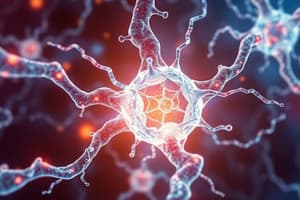Podcast
Questions and Answers
What is the primary role of glucagon in the body?
What is the primary role of glucagon in the body?
- Stimulates fat synthesis in adipose tissue
- Inhibits liver gluconeogenesis
- Promotes the storage of glucose as glycogen
- Increases blood glucose levels (correct)
Which of the following factors stimulates glucagon secretion?
Which of the following factors stimulates glucagon secretion?
- Insulin release
- Elevated fatty acids
- High blood glucose levels
- Catecholamines (correct)
What is one metabolic effect of glucagon on carbohydrate metabolism?
What is one metabolic effect of glucagon on carbohydrate metabolism?
- Increases glycolysis in muscle tissue
- Inhibits gluconeogenesis in the liver
- Enhances the storage of glucose in adipose tissue
- Stimulates the breakdown of liver glycogen (correct)
How long does it typically take for insulin to cause changes in enzymatic activity?
How long does it typically take for insulin to cause changes in enzymatic activity?
Which hormone is NOT considered a 'counterregulatory' hormone to insulin?
Which hormone is NOT considered a 'counterregulatory' hormone to insulin?
What is the primary function of chemical messengers in a cell?
What is the primary function of chemical messengers in a cell?
Which cells produce insulin?
Which cells produce insulin?
Which of the following stimuli would increase insulin secretion?
Which of the following stimuli would increase insulin secretion?
What is the role of the insulin receptor?
What is the role of the insulin receptor?
What effect does insulin have on nutrient mobilization?
What effect does insulin have on nutrient mobilization?
How is insulin secretion primarily regulated?
How is insulin secretion primarily regulated?
Which of these factors inhibits insulin secretion?
Which of these factors inhibits insulin secretion?
What happens to the insulin receptor after it binds to insulin?
What happens to the insulin receptor after it binds to insulin?
What effect does glucagon have on protein metabolism?
What effect does glucagon have on protein metabolism?
Which of the following correctly describes the mechanism of action of glucagon?
Which of the following correctly describes the mechanism of action of glucagon?
Which statement about insulin release is true?
Which statement about insulin release is true?
What is a physiological effect of glucagon on target cells?
What is a physiological effect of glucagon on target cells?
Which of the following is a common misconception about glucagon's signaling mechanism?
Which of the following is a common misconception about glucagon's signaling mechanism?
Flashcards
Insulin Action Time Course
Insulin Action Time Course
Increased glucose uptake occurs in seconds, changes in enzyme activity in minutes to hours, and changes in enzyme amount in hours to days.
Glucagon
Glucagon
A hormone secreted by pancreatic alpha cells; it opposes insulin's actions.
Glucagon Secretion Stimuli
Glucagon Secretion Stimuli
Low blood glucose, amino acids, and catecholamines stimulate glucagon release.
Glucagon's Effect on Blood Sugar
Glucagon's Effect on Blood Sugar
Signup and view all the flashcards
Glucagon's Effect on Fat
Glucagon's Effect on Fat
Signup and view all the flashcards
Cell Signaling
Cell Signaling
Signup and view all the flashcards
Chemical Messenger
Chemical Messenger
Signup and view all the flashcards
Insulin
Insulin
Signup and view all the flashcards
Insulin Receptor
Insulin Receptor
Signup and view all the flashcards
Signal Transduction
Signal Transduction
Signup and view all the flashcards
Glucose Transporter (GLUT-4)
Glucose Transporter (GLUT-4)
Signup and view all the flashcards
Islets of Langerhans
Islets of Langerhans
Signup and view all the flashcards
Metabolic Effects of Insulin
Metabolic Effects of Insulin
Signup and view all the flashcards
Glucagon's Effect on Amino Acids
Glucagon's Effect on Amino Acids
Signup and view all the flashcards
Glucagon's Receptor
Glucagon's Receptor
Signup and view all the flashcards
Glucagon's Signaling Pathway
Glucagon's Signaling Pathway
Signup and view all the flashcards
Insulin - True or False?
Insulin - True or False?
Signup and view all the flashcards
Glucagon - True or False?
Glucagon - True or False?
Signup and view all the flashcards
Study Notes
Cell Signaling and Metabolic Effects
- Cell signaling involves a cascade of events transmitting messages between cells.
- Hormones like insulin and glucagon play crucial roles in metabolism.
Types of Cell Signaling
- Contact-dependent: Signaling cells and target cells connect directly via membrane-bound signal molecules.
- Paracrine: Signal molecules act locally on nearby target cells.
- Synaptic: Neurotransmitters are released into a synapse, affecting adjacent cells quickly.
- Endocrine: Hormones travel through the bloodstream to target cells throughout the organism.
Chemical Messengers
- Chemical messengers are substances secreted by cells.
- They travel to target cells, bind to specific receptors, and elicit a response.
- This response transmits messages between cells, crucial for coordinating functions.
Intracellular Signaling Pathways
- Extracellular signal molecules bind to receptors, triggering intracellular signaling pathways.
- These pathways involve signaling proteins leading to alterations in target proteins.
- The result leads to altered metabolic enzymes, gene expression, or cytoskeletal proteins/movement.
Fast and Slow Responses
- Fast responses, on the order of seconds or minutes, alter existing proteins.
- Slow responses, in the range of minutes or hours, are initiated by altered protein synthesis or other cytoplasmic machinery.
Types of Receptors
- Cell-surface receptors: Hydrophilic signaling molecules bind to transmembrane receptors, initiating intracellular signaling cascades.
- Intracellular receptors: Hydrophobic signaling molecules (like steroids) cross the cell membrane and bind to intracellular receptors, directly influencing gene expression inside the nucleus.
Metabolic Effects of Insulin
- Insulin is a peptide hormone produced by beta cells of the pancreas.
- Insulin regulates glucose metabolism: promotes storage of nutrients in the body as glycogen, TAG, and protein.
- Insulin also inhibits the mobilization of stored nutrients.
- Insulin works by binding to a tyrosine kinase receptor.
- Several intracellular signaling pathways are involved, leading to cellular responses that affect glucose transport, glycogen synthesis, etc.
Metabolic Effects of Glucagon
- Glucagon is a peptide hormone secreted by alpha cells in the pancreas.
- Glucagon acts as a counter-regulatory hormone opposing the effects of insulin.
- Glucagon maintains blood glucose levels by stimulating glycogenolysis, gluconeogenesis, and ketogenesis.
- The mechanism involves cAMP as a second messenger activating protein kinase A, resulting in cellular responses.
Cellular Responses to Multiple Signals
- Cells can respond to multiple stimuli from different signal molecules.
- Different cells respond to the same signal in various ways (e.g., a heart cell vs. a skeletal muscle cell).
Specific Examples
- Different cells respond differently to acetylcholine, even though it is the same hormone/chemical messenger
- Heart cells, skeletal muscle cells and salivary gland cells respond to acetylcholine in differing ways.
Studying That Suits You
Use AI to generate personalized quizzes and flashcards to suit your learning preferences.
Related Documents
Description
Explore the intricate world of cell signaling and its metabolic effects. Learn about the different types of cell signaling, the role of chemical messengers, and how intracellular pathways function to maintain homeostasis. This quiz will enhance your understanding of how hormones like insulin and glucagon regulate metabolism.




